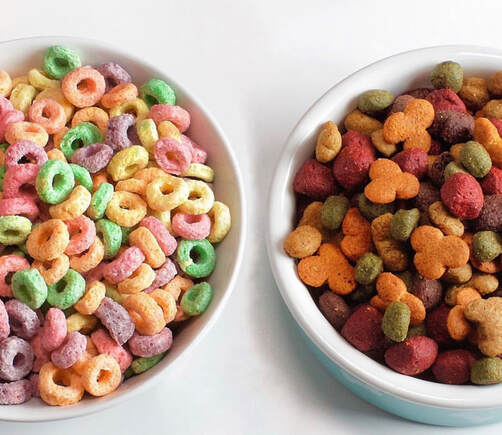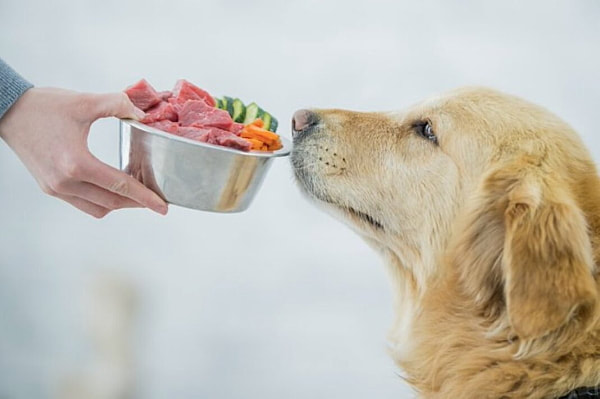FEED YOUR PET TO THRIVE, NOT JUST SURVIVE!
Whether you have a puppy, adult or senior dog, it's never too late to learn and adopt the practices of feeding your pet the way its body was really meant to eat. However, the longer a dog stays on the same commercialized all dry diet, the more likelihood of issues surfacing.
DOES YOUR PET SUFFER FROM ANY OF THE FOLLOWING ISSUES?
Chronic Yeasty Ear Infections
Obesity
Itchy Skin / Loss of Hair
Tear or Fur Staining
Excessive Licking
Hot Spots
Digestive Disorders
Then We May Be Able to Help!
Chronic Yeasty Ear Infections
Obesity
Itchy Skin / Loss of Hair
Tear or Fur Staining
Excessive Licking
Hot Spots
Digestive Disorders
Then We May Be Able to Help!
For years, Dana, the owner of the Dog Spaw, has been providing pet owners with FREE and personalized nutritional consultations to naturally heal their pets and provide the real nutritional requirements needed for dogs to thrive and have healthier lives. Whether you want to be proactive with the wellness of a new puppy or get to the root cause of an on-going mild issue with an older dog, she can certainly help! Dana have assisted hundreds of dog owners throughout the years to transition to a healthier dietary lifestyle or get to the actual cause of many chronic and common health issues plaquing pets nowadays. This is why The Dog Spaw sets itself apart from being a regular pet food store and being a true holistic health food stores for dogs in Monmouth County, New Jersey.
EMAIL DANA DIRECTLY TO REQUEST AN APPOINTMENT FOR YOUR FREE NUTRITIONAL CONSULT.
PLEASE NOTE THAT HER DIET QUESTIONNAIRE MUST BE PRINTED & COMPLETED AT THE TIME OF YOUR APPOINTMENT!
PLEASE NOTE THAT HER DIET QUESTIONNAIRE MUST BE PRINTED & COMPLETED AT THE TIME OF YOUR APPOINTMENT!
Lets Begin - Real Wellness Starts at the Bowl....
Common and chronic health issues such as yeasty ear infections, excessive tear stains, skin problems, digestive disorders, to major diagnoses of cancers and organ related diseases are plaguing our beloved pets more often now. Although some may say it's just from poor breeding and/or genetics, unfortunately, the truth is that it can be highly linked to the brand of food and how you feed your pet daily.
|
In a day and age where convenience and affordability are factors, pet owners should take in account the potential consequences of such choices when it comes to selecting their pet's food and what they are ultimately feeding their dog daily. Why is this so important? Because most, if not all, are in the routine of feeding their pet the exact same food day to day and for months to years! For example, nationally known and major pet food manufacturers (that I reference as the terrible three) are known to use cheap, low-grade filler ingredients that are not even conducive to a carnivores true nutritional requirements but are using harmful preservatives! Their food bags may proclaim "Natural", "Healthy", "Dogs Love It" on the front of the bags, but take into account, there is no weight in the wording until you actually read the ingredients (the fine print on the back) and know whether they are ALL healthy or not for your pet. What's even more astonishing, these major commercial pet food manufactures not only sponsor and fund all the vet colleges but are the same manufactures who further make the "prescription foods" that are only available through a vet after your dog has been diagnosed with such conditions that effect the skin or digestive organs, for example! With all the legal loopholes the pet food manufacturer can utilize and take advantage of under AAFCO rules nowadays, unfortunately, it can be at you and your pet's disadvantage.
|
Here is a list of the top five reasons why a pet owner chooses the wrong food:
1. You were drawn to a particular brand based on the 'creative' marketing techniques the manufacturer spends millions to make you buy it through commercials, print ads, social media & influencers and more.
2. Your friend, family and/or vet highly recommended it
3. You have used it in the past and thought nothing of switching the brand for your new pet
4. You were not fully educated in proper nutritional requirements your pet really needs and/or has never knew how harmful certain ingredients can do to your pet which consumes every day.
5. You never put any thought into it and simply buy it as it is easily accessible or the cheapest food on the grocery shelf.
1. You were drawn to a particular brand based on the 'creative' marketing techniques the manufacturer spends millions to make you buy it through commercials, print ads, social media & influencers and more.
2. Your friend, family and/or vet highly recommended it
3. You have used it in the past and thought nothing of switching the brand for your new pet
4. You were not fully educated in proper nutritional requirements your pet really needs and/or has never knew how harmful certain ingredients can do to your pet which consumes every day.
5. You never put any thought into it and simply buy it as it is easily accessible or the cheapest food on the grocery shelf.
The bottom line is, like humans, dogs are what they eat and unfortunately, many of the health issues are never linked to the food directly that they pet has been eating for some time and simply not discussed as often as it should with pet owners, especially by traditional veterinarians. This of course can then start a vicious cycle of prescription medications and prescription foods when in fact, the root cause is not actually being addressed.
Kibble is for Convenience - PERIOD!
Imagine eating dry cereal for the rest of your life; breakfast, lunch and dinner. Nothing more, nothing less. It's easy to eat and a convenience to serve. Therefore, would you expect you or your child's overall health to be at its best as if you were eating a variety of wholesome and healthy meals and snacks? We didn't think so and the same holds true for your dog's wellbeing. To be frank, kibble was made to be a convenience for YOU to feed your pet. It is easy to serve and will make your pet survive, but actually, your pet will never thrive like it should, especially on a diet like this for years. This is why at The Dog Spaw, we are here to educate pet owners with the top 10 key fundamentals to a truly healthy and happy dog and de-bunk all the myths you may have heard about how and what to feed your dog. To us, it's simple. A happier and healthier pet starts at the bowl.
|
1. No dog should never be on an all dry, processed food kibble entirely for every meal. Actually, less is best! The lack of natural moisture in dry food does not nourish the skin nor help any of the digestive organs function properly over time. Most importantly, kibble will never provide the natural vitamins & minerals a body needs to properly thrive. Rather, feeding a dog all dry foods make their bodies become co-dependent on all synthetic vitamins and minerals and ultimately puts their bodies in a partial state of a dehydration, to boot, which will affect the organs! Think of you eating the same dry cereal for every meal or a salad bowl filled with croutons with only a sprinkle of lettuce every day. Honestly, it's insane how most pet owners have been programmed to think this is the best way to feed their pet!
2. No dog should be fed a food blended with ingredients such as corn, wheat, soy, by-products, sugar, chemical preservatives, artificial food colorants, etc. All these types of ingredients are toxic to a dog's system and will cause chronic to severe health issues. 3. Meals with rice, barley, millet and oatmeal should be only used sparingly. Grain free diets are highly suggested whether using some kibble and canned foods despite what your vet may say. If your vet is still preaching about grain free diets and its link to DCM (dilated cardiomyopathy), a heart related issue, then he/she is using out of date studies. In 2020, the FDA concluded there was absolutely no link between grain free foods and this heart issue as less than 1000 dogs were affected through the 3+ year study. Read the latest findings here. Additionally, starchy grains are not conducive and not biologically correct for an animal that has an anatomy to mainly eat wholesome protein enriched foods. You would never see wolves or tigers regularly grazing on grains for their dietary intake! |
4. An adult dog should eat two meals daily and should entirely (or mostly, if using some kibble as a TOPPER) fed meals that contain minimally processed wholesome lean meats, organs and low glycemic vegetables. This can be through either the use of canned/moist foods, balanced home cooked meal preps or balanced raw meals from a reliable manufacturer such as the ones we sell. These types of foods are providing the natural moisture, enzymes and true vitamins/minerals that makes a dog's body thrive and function more properly. Unfortunately, overly processed dry kibbles that are loaded with all synthetically vitamins and minerals will never provide this.
5. A dog's meal should be rotated every few weeks with various different proteins and vegetables; always introducing new foods slowly. By feeding your pet the same blend consecutively for months to years can produce food borne allergies (intolerances) and a deficiency in the system.
6. A combination of raw meats, organs and vegetables from reliable manufacturers are the BEST choices should you opt to feed your pet "only the best". Raw pet food manufacturers are always using the best sourced ingredients like grass fed, free ranged humanely slaughtered animals and certified, organically grown fruits and vegetables. Additionally, they have the LEAST amount of recalls due to their processing methods and kill any bacteria through a high-pressure sanitation method.
7. By a dog eating dry food only, this is NOT going to keep their teeth clean! With dry food being enriched with more starches and carbohydrates, in turn, the starchy ingredients actually will start to adhere to the dog's teeth from the breakdown of carbohydrates. This in turn causes that "film" on the teeth whereas, when meals that consist of lean proteins and low glycemic vegetables will not have the same effect. Additionally, it's always best to provide natural bones and chews for your dog after they have eaten in conjunction with a regular schedule of brushing their teeth yourself. You can test this theory out yourself by running your tongue over your teeth a few hours after eating pretzels, dry cereals, hard candy, etc. before YOU brush your own teeth at night.
8. Life staged foods such as puppy and senior are only a marketing gimmick! Animals in the wild are not eating diets based on age and neither are humans! The only difference is that it is softened or pureed for babies and seniors that may have a lack of teeth!
9. Dogs that are overweight do not need "prescription diet food". Most often, the dog has been on a food enriched with more carbohydrates for some time. By simply changing the diet to foods with lean proteins and low starchy vegetables, your dog will lose the weight naturally.
10. Speaking of prescription foods, these types of "special diets" have been formulated by none other than the manufacturers who have been marketing and producing poor nutritional diets that most likely your dog has been on for some time.
5. A dog's meal should be rotated every few weeks with various different proteins and vegetables; always introducing new foods slowly. By feeding your pet the same blend consecutively for months to years can produce food borne allergies (intolerances) and a deficiency in the system.
6. A combination of raw meats, organs and vegetables from reliable manufacturers are the BEST choices should you opt to feed your pet "only the best". Raw pet food manufacturers are always using the best sourced ingredients like grass fed, free ranged humanely slaughtered animals and certified, organically grown fruits and vegetables. Additionally, they have the LEAST amount of recalls due to their processing methods and kill any bacteria through a high-pressure sanitation method.
7. By a dog eating dry food only, this is NOT going to keep their teeth clean! With dry food being enriched with more starches and carbohydrates, in turn, the starchy ingredients actually will start to adhere to the dog's teeth from the breakdown of carbohydrates. This in turn causes that "film" on the teeth whereas, when meals that consist of lean proteins and low glycemic vegetables will not have the same effect. Additionally, it's always best to provide natural bones and chews for your dog after they have eaten in conjunction with a regular schedule of brushing their teeth yourself. You can test this theory out yourself by running your tongue over your teeth a few hours after eating pretzels, dry cereals, hard candy, etc. before YOU brush your own teeth at night.
8. Life staged foods such as puppy and senior are only a marketing gimmick! Animals in the wild are not eating diets based on age and neither are humans! The only difference is that it is softened or pureed for babies and seniors that may have a lack of teeth!
9. Dogs that are overweight do not need "prescription diet food". Most often, the dog has been on a food enriched with more carbohydrates for some time. By simply changing the diet to foods with lean proteins and low starchy vegetables, your dog will lose the weight naturally.
10. Speaking of prescription foods, these types of "special diets" have been formulated by none other than the manufacturers who have been marketing and producing poor nutritional diets that most likely your dog has been on for some time.





